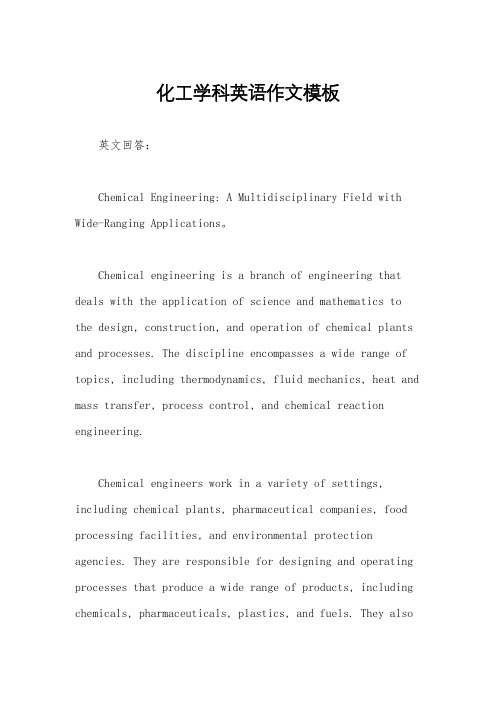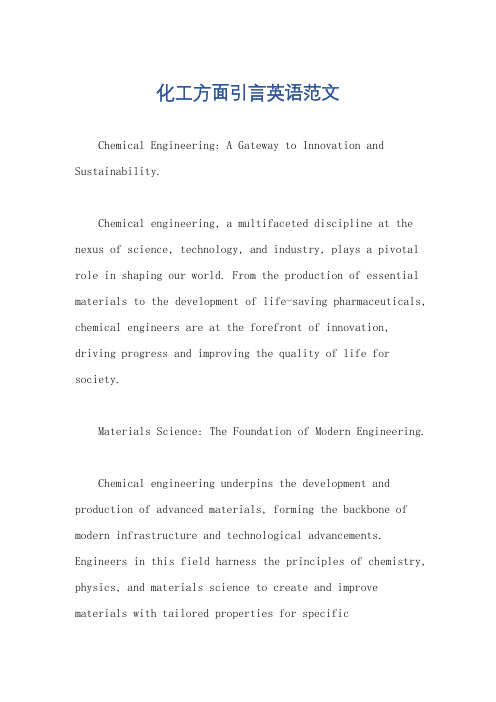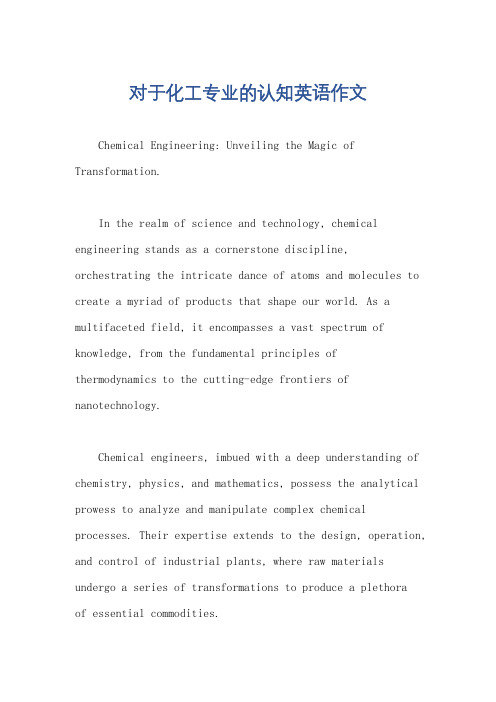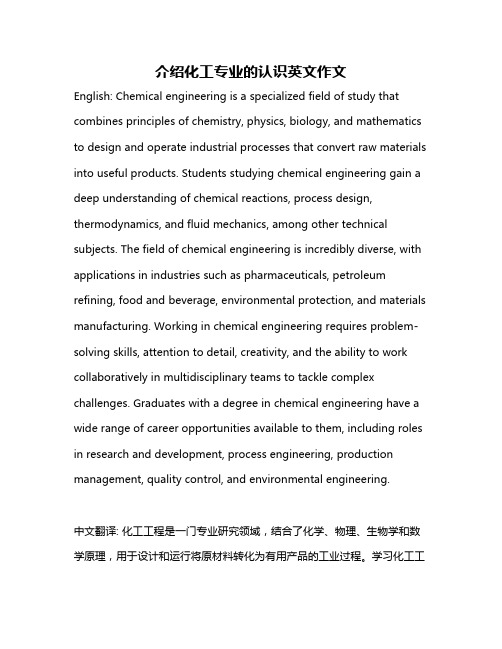化工专业英语科技论文
化工学科英语作文模板

化工学科英语作文模板英文回答:Chemical Engineering: A Multidisciplinary Field with Wide-Ranging Applications。
Chemical engineering is a branch of engineering that deals with the application of science and mathematics to the design, construction, and operation of chemical plants and processes. The discipline encompasses a wide range of topics, including thermodynamics, fluid mechanics, heat and mass transfer, process control, and chemical reaction engineering.Chemical engineers work in a variety of settings, including chemical plants, pharmaceutical companies, food processing facilities, and environmental protection agencies. They are responsible for designing and operating processes that produce a wide range of products, including chemicals, pharmaceuticals, plastics, and fuels. They alsowork to develop and improve processes that are more efficient, less polluting, and safer.Chemical engineering is a rapidly growing field, as the demand for chemicals and other products continues to increase. In addition, the need for sustainable and environmentally friendly processes is driving the development of new technologies and processes in the field.Key Features of Chemical Engineering。
化工专业科技英语作文

化工专业科技英语作文Chemical Engineering and Technology。
Chemical engineering and technology is a branch of engineering that applies physical sciences (e.g., chemistry and physics) and life sciences (e.g., biology, microbiology and biochemistry) together with mathematics and economics to produce, transform, transport, and properly use chemicals, materials and energy. It essentially deals with the design, construction, and operation of machines and plants that perform chemical reactions to solve practical problems or make useful products. It is a multidisciplinary field that involves a wide range of industries, from pharmaceuticals and food to petrochemicals and energy.Chemical engineers are involved in many aspects ofplant design and operation, including safety and hazard assessments, process design and analysis, control engineering, chemical reaction engineering, construction specification, and operating instructions. They are alsoresponsible for the development of new materials and technologies, such as nanotechnology, fuel cells and biomedical engineering. In addition, they play a key rolein environmental protection and the development of sustainable processes and products.Chemical engineering and technology is a rapidly growing field with great potential for future development. As the demand for energy and materials continues to increase, the need for chemical engineers will also grow. In addition, the increasing focus on environmental sustainability and the development of new technologies will create new opportunities for chemical engineers to make a significant impact on society.One of the key challenges facing chemical engineers today is the need to develop sustainable processes and products. With the increasing awareness of environmental issues and the finite nature of natural resources, there is a growing demand for processes and products that minimize waste, reduce energy consumption, and use renewable resources. Chemical engineers are at the forefront of thiseffort, developing new technologies and processes that are more sustainable and environmentally friendly.Another challenge facing chemical engineers is the need to develop new materials and technologies to meet the demands of a rapidly changing world. As new industries and technologies emerge, there is a growing need for new materials and processes that can meet the demands of these industries. Chemical engineers are working to develop new materials and technologies that can meet the needs of these industries, such as advanced materials for electronics, new materials for energy storage, and new processes for the production of biofuels.In conclusion, chemical engineering and technology is a dynamic and rapidly growing field with great potential for future development. Chemical engineers play a key role in the development of new materials and technologies, the design and operation of chemical processes, and the development of sustainable processes and products. With the increasing demand for energy and materials, and the growingfocus on environmental sustainability, the need for chemical engineers will continue to grow in the future.。
化工方面引言英语范文

化工方面引言英语范文Chemical Engineering: A Gateway to Innovation and Sustainability.Chemical engineering, a multifaceted discipline at the nexus of science, technology, and industry, plays a pivotal role in shaping our world. From the production of essential materials to the development of life-saving pharmaceuticals, chemical engineers are at the forefront of innovation, driving progress and improving the quality of life for society.Materials Science: The Foundation of Modern Engineering.Chemical engineering underpins the development and production of advanced materials, forming the backbone of modern infrastructure and technological advancements. Engineers in this field harness the principles of chemistry, physics, and materials science to create and improve materials with tailored properties for specificapplications. From lightweight composites for aerospace engineering to biocompatible implants for medical devices, chemical engineers are pushing the boundaries of material science to meet the demands of the future.Energy Conversion and Storage: Addressing Global Challenges.With the growing global energy demand and the urgent need for sustainable solutions, chemical engineers are atthe forefront of developing efficient and environmentally friendly energy systems. They design and optimize processes for the conversion, transportation, and storage of energy, exploring renewable sources such as solar, wind, and biomass. By harnessing their expertise in thermodynamics, fluid mechanics, and electrochemistry, chemical engineers are contributing to the transition towards a cleaner and more sustainable energy future.Pharmaceuticals and Biotechnology: Improving Healthcare.Chemical engineers play a crucial role in thepharmaceutical and biotechnology industries, where they design and optimize processes for the production of life-saving drugs and therapies. Utilizing their knowledge of reaction kinetics, bioprocessing, and separation technologies, they develop efficient methods for manufacturing biologics, vaccines, and other essential healthcare products. Chemical engineers are also at the forefront of drug delivery research, devising innovative strategies for targeted and personalized treatments.Process Engineering: Optimizing Industrial Efficiency.Chemical engineers are responsible for designing, operating, and optimizing industrial processes, ensuring efficient and sustainable production of chemicals, fuels, and other essential products. They apply principles of mass and energy transfer, thermodynamics, and reaction engineering to develop and improve processes, minimizing waste, reducing energy consumption, and meeting environmental regulations. Process engineering is a key aspect of chemical engineering, enabling industries to operate efficiently while meeting the demands of a growingpopulation.Sustainability and Environmental Protection.Chemical engineers are acutely aware of the environmental impact of industrial activities and are committed to developing sustainable solutions. They design and implement processes that minimize pollution, reduce greenhouse gas emissions, and conserve natural resources. Chemical engineers are also involved in the development of renewable energy technologies, waste management systems, and other initiatives aimed at protecting the environment and ensuring a sustainable future.Education and Training: Preparing the Next Generation.The field of chemical engineering is constantly evolving, with the emergence of new technologies and the need to address global challenges. Chemical engineering education provides students with a strong foundation in the fundamental principles of chemistry, mathematics, physics, and engineering, equipping them with the knowledge andskills necessary to succeed in this dynamic field. Universities and institutions around the world offer undergraduate, graduate, and research programs in chemical engineering, preparing the next generation of engineers to drive innovation and shape the future of our world.Conclusion.Chemical engineering is an essential discipline that touches every aspect of modern life. Chemical engineers are innovators, problem-solvers, and guardians of the environment, harnessing their knowledge and skills to create solutions that improve the quality of life for society. As the world faces new challenges and opportunities, chemical engineers will undoubtedly continue to play a pivotal role in shaping our future.。
如何学好化工专业的英语作文200字

How to Excel in Chemical EngineeringStudiesMastering the intricacies of chemical engineering requires a meticulous approach, combining theoretical knowledge with practical applications. Here are some key strategies to excel in this challenging field.First and foremost, a solid foundation in chemistry, physics, and mathematics is paramount. These fundamental subjects provide the building blocks for understanding the complex reactions and processes involved in chemical engineering. Engage in regular revision and practice to巩固基础。
Next, hands-on experience is invaluable. Participate in laboratory experiments and industrial visits to gain practical insights into the working of chemical plants and equipment. This practical exposure complements theoretical learning and enhances understanding.Moreover, stay updated with the latest advancements in the field. Subscribe to industry journals, attend conferences, and participate in seminars to stay abreast ofnew technologies and techniques. Staying informed helps in adapting to changing industry requirements.Additionally, developing problem-solving skills is crucial. Chemical engineering involves addressing a wide range of challenges, from process optimization to safety issues. Practice solving problems independently and in groups to enhance analytical and critical thinking.Lastly, collaboration and communication skills are essential. Chemical engineers often work in teams and need to effectively communicate ideas, findings, and recommendations. Cultivating good communication skills and learning to work collaboratively can significantly boost one's performance.In conclusion, excelling in chemical engineering requires a combination of theoretical knowledge, practical experience, continuous learning, problem-solving skills, and collaboration. By following these strategies, students can succeed in this challenging and rewarding field.**如何学好化工专业**学好化工专业需要一套系统的方法,它要求我们将理论知识与实践应用相结合。
化工专业英语写作范文

化工专业英语写作范文Title: The Evolution and Importance of Chemical Engineering: A Global Perspective.Chemical engineering, often referred to as the "mother of all engineering disciplines," has played a pivotal role in the advancement of technology and industrialization. Its impact is felt across multiple sectors, including energy, healthcare, environmental protection, and more. In this article, we delve into the evolution of chemical engineering, its current significance, and its future prospects.Evolution of Chemical Engineering.The roots of chemical engineering can be traced back to the Industrial Revolution, when the need for efficient and sustainable production methods arose. Initially, the field was primarily focused on the optimization of processes in the chemical industry, such as the production offertilizers and dyes. However, as technology advanced, the scope of chemical engineering broadened to include areas like biochemistry, environmental engineering, and nanotechnology.One of the most significant milestones in the evolution of chemical engineering was the development of the principles of reaction engineering in the early 20th century. This marked a shift from a reliance on empirical methods to a more rigorous and systematic approach, based on the principles of physics and chemistry. This development laid the foundation for the design and optimization of chemical reactors, which are crucial in the production of various chemicals.Another key development was the integration of computers into chemical engineering in the later part of the 20th century. This integration enabled engineers to model and simulate complex chemical processes, thus predicting their behavior more accurately. Computer-aided design (CAD) and computer-aided manufacturing (CAM) tools also revolutionized the design and fabrication of chemicalplants, making the process more efficient and cost-effective.Current Significance of Chemical Engineering.Today, chemical engineering is at the forefront of addressing many of the world's most pressing challenges. For instance, it plays a crucial role in the development of sustainable energy solutions. Chemical engineers are involved in the research and development of efficient solar cells, batteries, and fuel cells, as well as in the optimization of biofuel production processes.In healthcare, chemical engineering has madesignificant contributions to the development of drugs and therapies. By manipulating molecules at the nanoscale, engineers are able to create targeted drugs that are more effective and have fewer side effects. They are also involved in the design of medical devices and the optimization of bioprocessing techniques for tissue engineering and regenerative medicine.Moreover, chemical engineering is essential in addressing environmental challenges. Engineers are working to develop more efficient waste treatment and recycling methods, as well as to mitigate the impact of industrial processes on the environment. They are also involved in the research and development of sustainable materials that can replace traditional, environmentally harmful ones.Future Prospects of Chemical Engineering.The future of chemical engineering looks bright, with numerous opportunities for innovation and growth. One area that is expected to witness significant advancements is biotechnology. With the advent of synthetic biology and genome editing tools like CRISPR-Cas9, chemical engineers will be able to design and engineer cells and organisms with enhanced functionalities. This could lead to the development of novel bioproducts, such as bioplastics and biofuels, that are more sustainable and environmentally friendly.Another area of potential growth is nanotechnology.Chemical engineers are exploring the use of nanomaterialsin various applications, including drug delivery, energy storage, and environmental remediation. The uniqueproperties of nanomaterials, such as their large surface area and enhanced reactivity, make them ideal foraddressing many of the challenges faced by the chemical industry.Lastly, the integration of digital technologies, suchas artificial intelligence (AI) and the Internet of Things (IoT), is expected to transform chemical engineering. These technologies can be used to optimize processes in real-time, predict and prevent failures, and improve safety and sustainability. By leveraging the power of data analytics and predictive modeling, chemical engineers will be able to make more informed decisions and develop more efficient and cost-effective processes.In conclusion, chemical engineering has come a long way since its inception and continues to play a pivotal role in addressing the world's most pressing challenges. As we look to the future, it is exciting to imagine the innovativesolutions that chemical engineers will develop and the impact they will have on society.。
化工专业科技英语作文

化工专业科技英语作文英文回答:As a chemical engineering student, I've had the privilege of delving into a fascinating and ever-evolving field that shapes our technological advancements and everyday lives. One aspect that particularly piques my interest is the development of sustainable and renewable energy sources to address the challenges of climate change and ensure a cleaner future.In this regard, I'm particularly excited about the potential of solar energy. With its abundance and environmental friendliness, solar power holds immense promise as a viable alternative to fossil fuels. Theability of solar cells to directly convert sunlight into electricity through the photovoltaic effect has opened up countless possibilities for clean energy generation.One of the most significant breakthroughs in solartechnology has been the development of perovskite solar cells. Perovskites, a class of crystalline materials, exhibit exceptional light-absorbing properties and have demonstrated remarkable efficiencies in converting solar energy into electricity. This discovery has revolutionized the field, offering the potential for cheaper and more efficient solar panels.Another promising area of research is the exploration of artificial photosynthesis. This innovative approach aims to mimic the natural process of photosynthesis, where plants convert sunlight and water into glucose. By designing artificial systems that can perform similar reactions, we can potentially harness the power of sunlight to produce clean and renewable fuels, such as hydrogen and methanol.Furthermore, the development of nanotechnology is playing a pivotal role in advancing solar energy technologies. Nanoparticles and nanostructures can enhance the efficiency of solar cells by manipulating light absorption and charge transport properties. By tailoringthe size, shape, and composition of these nanomaterials, scientists can optimize the performance of solar devices.The integration of solar energy into our energy grids presents challenges and opportunities alike. Smart grid technologies, combined with energy storage systems, will be essential in managing the intermittent nature of solar power and ensuring a reliable and resilient energy supply. Additionally, the development of smart homes and buildings that incorporate solar energy generation and storage will empower consumers to take a more active role in their energy consumption and contribute to a more sustainable future.In conclusion, the pursuit of sustainable and renewable energy sources through chemical engineering is acaptivating endeavor that holds the key to addressing the urgent challenges of climate change while ensuring a brighter future for our planet. As a student in this field, I'm eager to contribute to these advancements and make a meaningful impact on the world.中文回答:身为一名化工专业的学生,我很荣幸能够深入钻研这个迷人且不断发展的领域,它塑造了我们的技术进步和日常生活。
对于化工专业的认知英语作文

对于化工专业的认知英语作文Chemical Engineering: Unveiling the Magic of Transformation.In the realm of science and technology, chemical engineering stands as a cornerstone discipline,orchestrating the intricate dance of atoms and molecules to create a myriad of products that shape our world. As a multifaceted field, it encompasses a vast spectrum of knowledge, from the fundamental principles of thermodynamics to the cutting-edge frontiers of nanotechnology.Chemical engineers, imbued with a deep understanding of chemistry, physics, and mathematics, possess the analytical prowess to analyze and manipulate complex chemical processes. Their expertise extends to the design, operation, and control of industrial plants, where raw materials undergo a series of transformations to produce a plethoraof essential commodities.The chemical engineering profession plays a pivotalrole in meeting the ever-increasing demands of a growing population. From developing sustainable energy sources to devising innovative pharmaceuticals, chemical engineers are at the forefront of addressing global challenges and improving the quality of life.Unveiling the Core Principles: A Foundation of Scientific Understanding.At the heart of chemical engineering lies a profound understanding of the fundamental principles governing the behavior of matter. Thermodynamics provides a framework for analyzing energy transfer, while fluid mechanics elucidates the dynamics of fluids in motion. Transport phenomena, encompassing heat transfer, mass transfer, and momentum transfer, provides a vital foundation for understanding the mechanisms underlying chemical processes.Unit operations, the building blocks of chemical engineering, represent specific processes utilized toseparate, purify, or transform chemical substances. These operations, ranging from distillation and filtration to crystallization and drying, are combined and optimized to achieve the desired product specifications.Industrial Alchemy: From Raw Materials to Value-Added Products.Chemical engineers are the orchestrators of industrial-scale chemical transformations, translating scientific principles into tangible products. They design and operate chemical plants, where raw materials such as petroleum, natural gas, and minerals are meticulously processed to produce a vast array of essential commodities.The chemical industry is a cornerstone of modern society, providing the foundation for countless products that touch every aspect of our lives. From plastics and fertilizers to pharmaceuticals and electronics, chemical engineers play an indispensable role in shaping the material fabric of our world.Advancing Frontiers: Pushing the Boundaries of Innovation.Beyond the traditional realms of chemical engineering, the field is constantly evolving, embracing new technologies and pioneering new frontiers. Nanotechnology, for instance, holds the promise of revolutionizing everything from drug delivery to energy storage.Chemical engineers are also at the forefront of developing sustainable solutions to the global challenges facing humanity. They are working to reduce carbon emissions, develop renewable energy sources, and design more efficient and environmentally friendly industrial processes.A Lucrative and Rewarding Career Path: The Rewards of a Chemical Engineering Degree.The field of chemical engineering offers a rewarding and lucrative career path for those with a passion for science and innovation. Chemical engineers are in highdemand across a wide range of industries, including pharmaceuticals, petrochemicals, food processing, and energy.A chemical engineering degree provides a strong foundation for a variety of technical and management roles, including research and development, process design, plant operations, and project management. The median annual salary for chemical engineers is significantly higher than the average salary for all occupations.Conclusion: A Vital Discipline for the Future.Chemical engineering is a dynamic and ever-evolving field that plays a pivotal role in shaping the world around us. Its practitioners are the architects of industrial transformations, unlocking the potential of matter to create a myriad of products essential to modern society.As the world faces unprecedented challenges, chemical engineers will continue to be at the forefront of innovation, developing sustainable solutions and pushingthe boundaries of scientific knowledge. Their expertise will be crucial in addressing global issues, improving the quality of life, and ensuring a brighter future for generations to come.。
介绍化工专业的认识英文作文

介绍化工专业的认识英文作文English: Chemical engineering is a specialized field of study that combines principles of chemistry, physics, biology, and mathematics to design and operate industrial processes that convert raw materials into useful products. Students studying chemical engineering gain a deep understanding of chemical reactions, process design, thermodynamics, and fluid mechanics, among other technical subjects. The field of chemical engineering is incredibly diverse, with applications in industries such as pharmaceuticals, petroleum refining, food and beverage, environmental protection, and materials manufacturing. Working in chemical engineering requires problem-solving skills, attention to detail, creativity, and the ability to work collaboratively in multidisciplinary teams to tackle complex challenges. Graduates with a degree in chemical engineering have a wide range of career opportunities available to them, including roles in research and development, process engineering, production management, quality control, and environmental engineering.中文翻译: 化工工程是一门专业研究领域,结合了化学、物理、生物学和数学原理,用于设计和运行将原材料转化为有用产品的工业过程。
- 1、下载文档前请自行甄别文档内容的完整性,平台不提供额外的编辑、内容补充、找答案等附加服务。
- 2、"仅部分预览"的文档,不可在线预览部分如存在完整性等问题,可反馈申请退款(可完整预览的文档不适用该条件!)。
- 3、如文档侵犯您的权益,请联系客服反馈,我们会尽快为您处理(人工客服工作时间:9:00-18:30)。
How to Write an Research Paper (科技论文的写作)
( 2 ) 顺序式:格式 --- [ 编号 ] 作者,论 文名,期刊名,卷号,页码(年 份). 例 : [1] James. A. D. , Synthesis of ABS , Macromolecules , 21 , 2315(1989).
How to Write an Research Paper (科技论文的写作)
1. Importance of Research Paper (论文的重要性) 1)科技工作者公开自己研究成果的重要途径; 2)促进科技人员间的相互了解与交流; 3)迅速、及时地反映最新的研究动态。 2. Select a Proper Topic(论文的选题)
3. Method of writing an abstract (文摘的 写作方法)
2)报导性文摘:写出文章的研究意义;采用的 研究方法;提出的新观点、新理论;及主要的 结果、结论。
Common Words:be given,be obtained,be devised(设计、发明、创造),be derived, be measured,be established,be considered,be based on
How to Write an Research Paper (科技论文的写作)
* Thesis 与 Paper 的区别: Paper 只写创 新之处,较深; Thesis 要有系统性,有章 节。在突出创造性的同时,有必要的理论 阐述和公式推导。
How to Write an Research Paper (科技论文的写作)
How to Write an Research Paper (科技论文的写作)
3)Method of Design and Calculation (设计 方法和计算方法):工艺流程、工艺条件及其 依据,原始数据及边界条件。 4)Method and Condition of Experiment < Experimental>(实验条件及实验方法):照片 、示意图。 5)Results and Discussion(数据结果与讨论 ):曲线、表格、照片(优点:a.形象化;b. 对比;c. 反衬;d. 一数多用)。
Common Instruments for Chemical Experiment
吸滤瓶和布式漏斗(filter flask and Buchner funnel),称量瓶(weighing bottle),表面皿(watch glass),滴管( burette (buret)),T形管(T joint),Y形 管(Y joint),U形管(U tube),三颈烧瓶 (3-necked flask),冷阱(liquid trapper ),干燥管(drying tube),干燥器( desiccator),滴瓶、细口瓶、广口瓶( reagent bottle)
引用格式:......by James’method[1]. 或:......by James’method[1,2]. 或:......by James’method[1-5].
Common Instruments for Chemical Experiment
(化学实验常用仪器的英文名称) 普 通 试 管 (test-tube) , 离 心 试 管 ( centrifugal test-tube ) , 试 管 架 ( testtube rack ),试管夹( test-tube clamp ), 泥 三 角 ( wire triangle ) , 温 度 计 ( thermometer ) , 烧 杯 ( beaker ) , 毛 刷 ( hair brush ),锥形瓶( conical flask ), 量筒( measuring cylinder ),漏斗( funnel ) 吸 量 管 、 移 液 管 ( pipette ) , 容 量 瓶 ( volumetric flask ) , 酸 式 滴 定 管 ( acidic burette),碱式滴定管(basic burette)
4. Notes(注意事项)
1 ) 不 能 用 第 一 人 称 ; ( Do not use first person) 2)不必列举例证;(No examples) 3 )不要超出原文内容;( Do not exceed content of the original paper) 4 ) 不 能 与 其 他 文 章 作 比 较 ; ( Do compare with other paper) 5 ) 不 要 重 复 标 题 ; ( Do not repeat titles)
Specialized English for Chemistry
Feng n Abstract
(英语文摘的写作)
1. Uses of abstract(文摘的用途) 1)迅速、准确地表达文章的内容;2)独立出版 ;3)论文的先行官。 * 文摘美国国家标准(ANSI 1971Z 39.14)
How to Write an Research Paper (科技论文的写作)
6)Conclusion(结论): ①本文的主要成就; ②本文的创造性与先进性; ③对论文的自我评价; ④今后努力方向(不足之处)。 7)Acknowledge(致谢) 8 ) References (参考文献):越全越好、越 多越好。 9)Appendix(附录): ①重要公式的详细推导;②简略词表; ③计算机源程序等。
* 应避免:
1)太长(英文勿超过两行);2)无创新性; 3)领域太宽;4)使用常用词,如“研究”,“ 讨论”, “探讨”,“分析”,“规律”等;5 )名词不规范。
How to Write an Research Paper (科技论文的写作)
3. Content and Structure(内容和结构) 1)Introduction(引言、前言、导言): ①研究目的和意义( Purpose & Significance ):经济、军事、社会、理论等; ②国内外研究现状(Background):宜详细; ③本文的新工作( New Work):方向、解决的 问题、成果等。 2 ) Theory & Methods (理论及方法):别人 的一提而过,自己的详写。提出的新理论、新 方法要写清适用条件。
Common Instruments for Chemical Experiment
普通圆底烧瓶(round flask),磨口圆底烧瓶 ( ground-in round flask ) , 蒸 馏 烧 瓶 ( distilling flask ) , 分 液 漏 斗 ( separating basin ),滴液漏斗( dropping funnel ) , 冷 凝 管 ( condenser ) , 蒸 馏 头 ( distillation head ),塞子( stopper ), 应 接 管 ( distillation adapter ) , 坩 埚 (crucible ),蒸发皿(evaporating basin ), 研钵( mortar ),药勺( spatula ),点滴板 ( spot plate ),水浴锅( water bath ),三 脚架(tripod)
* 强调结果
3. Method of writing an abstract (文摘的 写作方法) * 开头: This paper deals with...... ; In this paper,...... * 总结: Since ; Therefore ; Thus ; In a word ; We can conclude that...... ; It can be conclude...... * 通常采用被动语态和一般现在时。
* Reference 的列法: ⑴ 哈佛式:格式 --- 作者(年份)论文名, 期 刊名,页码. 例: James. A. D. ( 1989 ) Synthesis of ABS ,Macromolecules,235-238. 两个作者: James. A. D. and Klam. C. B. (1989)Synthesis of...... 三 个 作 者 : James. A. D. , Klam. C. B. , Hara. M.(1989)Synthesis of...... 三个以上:James. A. D.,et al.(1989) Synthesis of......
Commonly Used Expressions in Polymer Science & Engineering (聚合物科学与工程常用词汇)
polymer ( 聚 合 物 , 分 子 结 构 中 有 重 复 单 元 ( repeated unit )。);塑料( plastic ); 橡胶( rubber ); macromolecule (大分子, 统称,包括无重复单元的大分子化合物如蛋白 质、核糖核酸); high polymer (高聚物,有 重复单元,且为用合成方法(尤其是加聚法) 制成。 Synthetic ,( esp. through addition polymerization ));合 成纤维 ( synthetic fiber);涂料(coatings);
Common Instruments for Chemical Experiment
石棉网(asbestos center gauze),铁架台 (ring stand),铁圈(ring),铁夹(烧瓶 夹,flask clamp)坩埚钳(crucible tongs), 碘量瓶(iodine flask),燃烧匙 (combustion spoon),砂芯漏斗(glass sand funnel),集气瓶(gas-jar)
How to Write an Research Paper (科技论文的写作)
